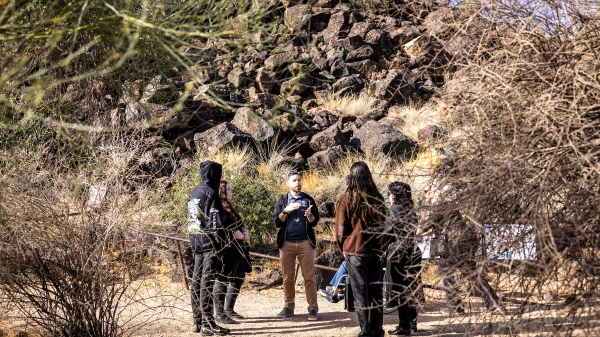ASU Regents' Professor honored by Princeton conference

Regents' Professor Stephen Bokenkamp will attend a conference in his honor at Princeton University.
In a tribute to his impact on studies of medieval Chinese Daoism, former students of Arizona State University Regents' Professor Stephen Bokenkamp, have organized a conference in his honor. The Oct. 6 event will include speeches by Bokenkamp’s colleagues in the field and a presentation by Bokenkamp himself.
“They’d been talking to my wife secretly for a long time and already organized this,” said Bokenkamp, from the School of International Letters and Cultures. “It’s not just my students who will be there, it’s my colleagues from all over the world.”
The conference is titled, “The Way and the Words: Religion and Poetry in Medieval China, a Conference in Honor of Professor Stephen Bokenkamp” and will take place at Princeton University.
The event description cites that “Bokenkamp’s scholarship has been groundbreaking for bringing together the many cross-currents of religious, intellectual, and literary traditions that are usually studied separately.”
Bokenkamp has taught at SILC for the last 10 years, but he taught the former students in charge of the conference, Anna Shields and Gil Raz, at Indiana University. Shields now teaches at Princeton University, Raz at Dartmouth College.
“This is a small field I work in, the field of Chinese Daoism and Chinese religion more generally,” Bokenkamp explained, “I’ve always tried to make sure my students coordinate and work well with each other, have a rapport. So the very first thing I wanted to do was make sure my students from ASU and more recently graduated ones from Indiana show up and have a chance to meet all these people.”
At least two ASU students will attend the conference with Bokenkamp.
Studying Daoism requires people to shift their understanding of religion, Bokenkamp explained, exploring an entirely different cultural mindset.
His students speak and read Chinese, read classical Chinese and learn Japanese.
“I started during the cultural revolution [in China] when they were trying to destroy this stuff,” Bokenkamp said. “I started with a mission in mind. This is not just a part of China’s cultural heritage, this is world cultural heritage, and someone needs to preserve it.”
More Arts, humanities and education

Petroglyph preserve celebrates 30th anniversary with ancient, modern tales
The Deer Valley Petroglyph Preserve provides a beautiful walk through a pristine desert where chuckwalla lizards are as plentiful…

Kaleidoscope short film contest inspires powerful binational filmmaking in its second year
“We come to this country not to steal anybody’s jobs but to take advantage of the opportunities that the rest ignore. We’ve been…

ASU's Neal Lester reflects on life, death of poet Nikki Giovanni
When Neal Lester heard on Monday that poet and activist Nikki Giovanni had died, the news hit hard.Lester, the founding director…